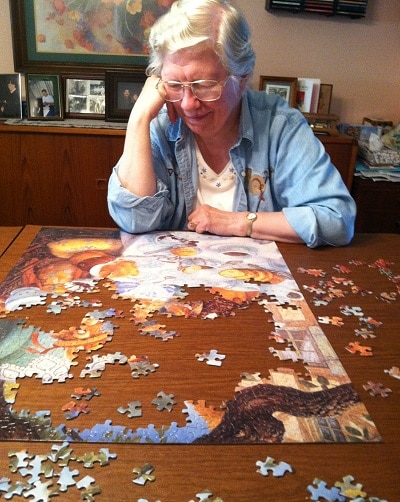Karen Marez

By focusing on putting together the pieces of our reality and accepting the irreparable changes of Alzheimer’s, we were able to focus on finding joy in all the moments we continued to share with Mom and help her find pleasure in the activities she loved. It was key to finding the most positive way of travelling this journey with our loved one and the disease.
April 15, 2021
Alzheimer’s advocate and volunteer Karen Marez, whose late mother journeyed through the disease from 2008 to 2014, is writing a book about her family’s experience of caregiving for her mother.
Searching in vain for the missing puzzle piece, I glanced across the partially completed puzzle that Mom had been working on for a few days. A section towards the top caught my eye as the color pattern didn’t seem to match up perfectly. I pulled up one piece and carefully examined it, wondering how my mom had managed to squeeze it in there.
“Mom, it appears that someone has trimmed this puzzle piece to fit up here,” I said, “but I actually need it to fit in this spot down below. Gee, I wonder how that happened.“
Mom looked at me in shock, replying as honestly as she could, “Oh, for Pete’s sake! I don’t know who would’ve done such a thing! What on earth is happening at puzzle factories these days?!”
I had to chuckle inside. She really had no recollection that it was most definitely her who had taken scissors or a kitchen knife to trim the pieces, or perhaps she had whittled it down with the fingernail clippers she kept in her purse, which was always by her side.
Determined to not leave the puzzle unfinished, Mom and I shrugged our shoulders and set ourselves to completing it as best we could with a few clipped away bits.
I had learned by that point not to dwell on some of the unusual moments brought on by Alzheimer’s. If I had pushed to solve the mystery and point out what was obvious to me, it would have only led to undue stress for Mom as she would eventually realize that she must have been the culprit. When the puzzle was finally completed, I saw that from the right angle and a bit of distance, it still looked quite beautiful. In truth though, one could see up close that there had been an irreparable change.
Mom had always prided herself on her spatial reasoning skills. Her attention to space, details, and color — which had helped her create many beautiful gardens over the years — made her a masterful puzzle fanatic throughout her life. We had worked on puzzles together for as long as I could remember. Now, time spent tackling puzzles during my visits with her on evenings and on the weekend felt like one of the best choices for an activity to do together.

Dad sometimes called those visits “mom-watch duty” and appreciated that it allowed him some respite from his duties as her main caregiver, a job he persevered at while also battling back non-Hodgkin’s lymphoma cancer several times. I had always tried to keep my visits with Mom as normal as possible, but this tampered puzzle incident brought the realization that her ability to tackle a 1000 or more-piece puzzle with intricate design had clearly been altered by Alzheimer’s and resulted in some unexpected behavior.
Driving home that day, I wondered if easier puzzles might help us avoid another incident brought on by the frustration Mom encountered when things didn’t seem to fit where she thought they should. Mom was already dealing with this very thing in other areas of her life — but up to that point it had mostly been with communication.
I’d witnessed her struggling so many times to find the right words to fit a thought she wanted to convey. I’d seen the frustration behind her eyes in many of those moments, so I decided that our puzzle time shouldn’t become just one more reason to bring her stress. I would soon find myself searching online for different options, puzzles with fewer pieces at first and, later on, even ones with larger pieces.
Over the next year and a half, we would work our way down from 750, 500, 300, 200, 100, and eventually trim it down to 60-piece puzzles, allowing her to still have the joy of completing a puzzle without unnecessary frustration.
As Alzheimer’s whittled away at our mom’s brain abilities, it also showed that our family needed to be ready to alter our approach to fit whatever situation Alzheimer’s might bring next, just as how we adapted puzzle time for Mom. I researched respite care options for the times my siblings and I couldn’t help with Mom due to our jobs. I looked for information about upcoming stages of the disease at the Alzheimer’s Association website. I found online forums to connect with others who understood this journey, helping me feel more supported and less alone. I watched videos to gain better understanding of Alzheimer’s and quality caregiving techniques — which meant I learned who dementia care guru Teepa Snow was.
By focusing on putting together the pieces of our reality and accepting the irreparable changes of Alzheimer’s, we were able to focus on finding joy in all the moments we continued to share with Mom and help her find pleasure in the activities she loved. It was key to finding the most positive way of travelling this journey with our loved one and the disease.
Ultimately, I was shown at every stage that it is WE who must find the way to fit into our loved one’s journey, instead of asking them to fit our expectations. It might mean settling for a slightly different result than expected, but by looking at the situation from the right perspective, there is still beauty to be found.